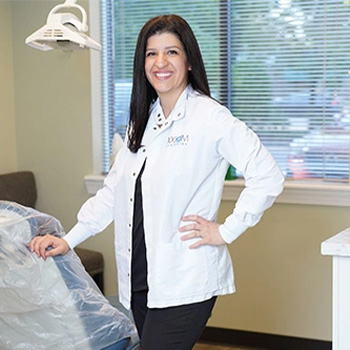Sleep Apnea in Raleigh, NC
Sleep Apnea/Snoring in the Raleigh Area
Snoring is a problem that affects nearly half of all adults to some extent. In most cases, it is nothing more than a slightly embarrassing issue that happens when a person is asleep. But this does not mean that snoring should be taken lightly, as it is also the defining characteristic of a serious medical condition called obstructive sleep apnea. While only about 20 percent of all snoring cases are related to obstructive sleep apnea, it is still very important to have a person’s chronic snoring habit examined in order to rule out this possibility.
At Axiom Dentistry, our team of experts will be able to determine if your snoring is a serious medical threat or just a minor nighttime annoyance. Once we uncover the cause of the problem, we will help you put a rest to the habit so that you can enjoy the night of sleep that you deserve.
Snoring vs. Sleep Apnea
Snoring occurs due to blockages that occur in the passages that are found in the back of a person’s mouth and nose. When flowing air passing through these areas becomes blocked, it creates loud vibrations or snores.
Typically, these blockages are caused by the throat becoming overly relaxed while the snorer is asleep. While this can be annoying for both the snorer and their sleeping partner, it is usually nothing to worry about, and it can be ignored entirely if the snoring is not a problem.
That being said, it is still strongly advised that patients have their snoring examined by a professional. This is because a small number of snoring cases are the result of a potentially dangerous medical condition known as obstructive sleep apnea. This condition occurs when a person experiences breathing trouble while they are asleep.
A person suffering from obstructive sleep apnea will have pauses in their breathing that last anywhere from a few seconds to more than a minute. If obstructive sleep apnea is left untreated, it can result in life-threatening issues, including heart attack and stroke.
Treatment for Snoring and Sleep Apnea
While snoring and sleep apnea tend to go hand in hand, the respective treatment methods for these disorders are quite different.
Snoring can generally be treated by making positive lifestyle changes and basic adjustments to one’s sleeping habits. These include:
- Losing weight
- Exercising more
- Avoiding sleep medication
- Reducing alcohol consumption
- Sleeping on the side instead of the back
- Elevating the head while asleep
Obstructive sleep apnea is a more serious problem that often requires direct medical intervention. Some treatment methods for obstructive sleep apnea include:
- CPAP Devices
- Oral Appliance Therapy
- Surgery











